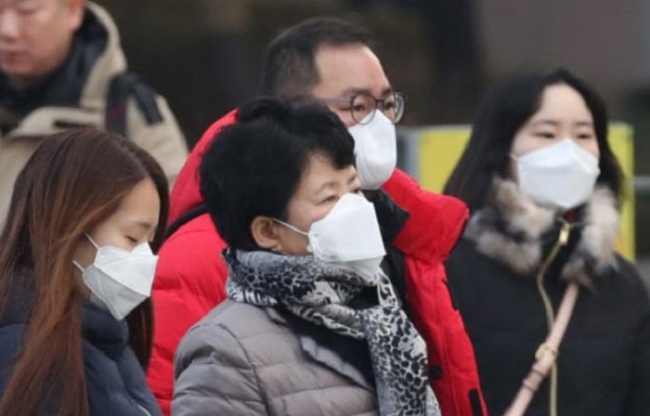Foreigners unsure how to respond to dangerous air pollution
By Bak Se-hwanPublished : Jan. 22, 2018 - 16:10
When Seoul waived public transportation fees last week as part of antipollution emergency measures, Mike Hugo, 31, a foreign resident who has been working in South Korea since 2009, also received an “important notification” via text message; only he couldn’t read Korean.
“I received notifications of emergency situations on Jan. 14, 16 and 17. Of course the messages were in Korean. I had to copy and paste the messages into the Papago app to confirm that it was about fine dust and free public transport, although I’m unsure how it works,” Hugo told The Korea Herald.
Hugo said foreign residents here post to local Facebook groups asking what the messages say whenever cities or state official notifications are sent out, including a message last November about the Pohang earthquake, the second-strongest quake ever recorded here that left more than 1,500 homeless.
“I received notifications of emergency situations on Jan. 14, 16 and 17. Of course the messages were in Korean. I had to copy and paste the messages into the Papago app to confirm that it was about fine dust and free public transport, although I’m unsure how it works,” Hugo told The Korea Herald.
Hugo said foreign residents here post to local Facebook groups asking what the messages say whenever cities or state official notifications are sent out, including a message last November about the Pohang earthquake, the second-strongest quake ever recorded here that left more than 1,500 homeless.

“I think the air pollution in the last few years has become heavier and heavier on people’s minds, including for foreign residents. People ask about the security situation with North Korea, but I haven’t known anybody who decided to leave Korea based on that, but quite a few leaving or thinking of leaving because of the worsening air quality, even some who had been here more than a decade,” Hugo added.
Amid worsening air quality, the Seoul Metropolitan Government activated the city’s free public transport program three times last week, along with other measures including a mandatory alternate no-driving program in the public sector on days when the daily density average of particulate matter exceeds 50 micrometers per cubic meter for two consecutive days.
But in the capital city, home to nearly one-third of 2 million residents who came from abroad, foreign residents cry foul over lack of emergency information available in English in the event of natural disasters.
Many foreign residents use real-time air quality index site aqicn.org to find out about the level of air pollution instead of relying on government-provided data because they feel they are on their own, according to another long-term foreign resident of Seoul.
“Some foreigners are very bothered indeed. Particularly parents and people who have been here long-term,” said the man who wished to remain anonymous. “They are angry because the government seems to continually understate how bad it is. And because of lack of information for foreigners on air pollution, many wrongly believe the Moon Jae-in government blamed China unduly (for causing air pollution) when it’s really South Korea’s fault. Many think it is all coal power plants because Greenpeace told them, when it isn’t really.”
Currently, foreigners whose cellphones are not registered to local mobile carriers should download the “Emergency Ready App” on their phones in order to receive real-time natural disaster alerts in English.
An official from the Ministry of the Interior and Safety that sends out the emergency notification messages across the country blames “too many technical barriers” for preventing the service from being provided for foreign residents and visitors here.
“We need to figure out how to send messages to cellphones that use foreign mobile carriers,” the official said.
By Bak Se-hwan (sh@heraldcorp.com)








![[Graphic News] More Koreans say they plan long-distance trips this year](http://res.heraldm.com/phpwas/restmb_idxmake.php?idx=644&simg=/content/image/2024/04/17/20240417050828_0.gif&u=)
![[KH Explains] Hyundai's full hybrid edge to pay off amid slow transition to pure EVs](http://res.heraldm.com/phpwas/restmb_idxmake.php?idx=644&simg=/content/image/2024/04/18/20240418050645_0.jpg&u=20240419100350)





![[From the Scene] Monks, Buddhists hail return of remains of Buddhas](http://res.heraldm.com/phpwas/restmb_idxmake.php?idx=652&simg=/content/image/2024/04/19/20240419050617_0.jpg&u=20240419175937)

![[KH Explains] Hyundai's full hybrid edge to pay off amid slow transition to pure EVs](http://res.heraldm.com/phpwas/restmb_idxmake.php?idx=652&simg=/content/image/2024/04/18/20240418050645_0.jpg&u=20240419100350)

![[Today’s K-pop] Illit drops debut single remix](http://res.heraldm.com/phpwas/restmb_idxmake.php?idx=642&simg=/content/image/2024/04/19/20240419050612_0.jpg&u=)